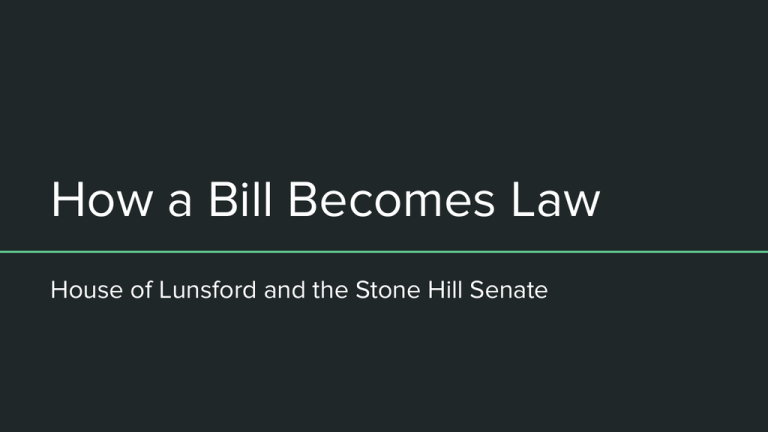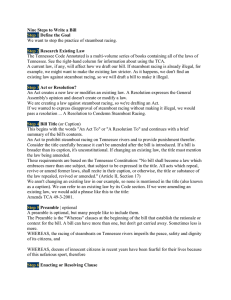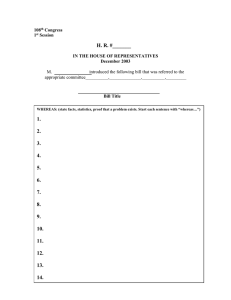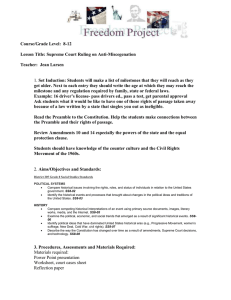How a Bill Becomes Law
advertisement

How a Bill Becomes Law House of Lunsford and the Stone Hill Senate Creating a Law - Topics to Consider STONE HILL SENATE ○ ○ ○ ○ ○ ○ ○ ○ ○ ○ ○ ○ Snow day modification (firm end date with added days due to snow rather than current) Toll on I-66 (for or against) Zero tolerance for underage DUIs Reducing # of SOLs Propose Constitutional Amendment for 2+ term Governor Year-round schooling Regulate carbon dioxide emissions from existing power plants Arming teachers and administrators Double texting while driving fines Child labor permits (14-15) Passing stopped school busses Other (student generated and approved), etc HOUSE OF LUNSFORD ○ ○ ○ ○ ○ ○ ○ ○ ○ ○ ○ Lowering the driving age Start before Labor Day*/School Calendar Necessity/Sin taxes Mandatory vaccinations* Exemptions Homeschool students play high school sports/Tebow Law School vouchers* Harsher penalties for breaking EMS Equipment Cell phone use while driving (holding phone while talking) (learners permit holders) Mandate plan to implement full-day Kindergarten Switch from winner-take-all to district electoral votes system Other (student generated and approved), etc Act or Resolution? An Act creates a new law or modifies an existing law. A Resolution expresses the General Assembly's opinion and doesn't create or modify a law. We are passing a…. Bill Title This begins with the words "An Act To" or "A Resolution To" and continues with a brief summary of the bill's contents. Example:An Act to prohibit steamboat racing on Tennessee rivers and to provide punishment therefore. Consider the title carefully because it can't be amended after the bill is introduced. If changing an existing law, the title must mention the law being amended. Preamble A preamble is optional, but many people like to include them. The Preamble is the "Whereas" clauses at the beginning of the bill that establish the rationale or context for the bill. A bill can have more than one, but don't get carried away. Sometimes less is more. Example: WHEREAS, the racing of steamboats on Tennessee rivers imperils the peace, safety and dignity of its citizens, and WHEREAS, dozens of innocent citizens in recent years have been fearful for their lives because of this nefarious sport, therefore Enacting or Resolving Clause This is standard language that precedes the body of the bill. When writing an act, the operative word is "Enacted". If it's a resolution, substitute the word "Resolved". It is typed in all capital letters. BE IT ENACTED BY THE 2016 GENERAL ASSEMBLY OF THE VIRGINIA STATE LEGISLATURE: Body of the Bill Here is where we get down to business. The body of the bill is broken into sections, each of which is numbered with Arabic numerals. A section may have more than one paragraph. A section may have sub-sections, which are lettered. A sub-section may also have more than one paragraph. Ex: Section 1. The captain of any steamboat that engages in a competition with one or more other steamboats to reach a destination shall be guilty of the crime of "Steamboat Racing". Section 2. The sheriff of any county passed by the racing steamboats may arrest the captains of said steamboats and incarcerate them in the county jail. Section 3. Upon conviction in a competent Court of law, the judge shall sentence the captain to one of the following punishments as the Court shall deem appropriate: (a) For the first offense, a Class C misdemeanor. (b) For the second and subsequent offenses, a Class B misdemeanor (c) In the alternative, to pick up litter along the riverbank. Effective Date The final section of the bill tells when it takes effect. Section 4. This act shall take effect July 1, 2009. The phrase "the public welfare requiring it" is added if the law takes effect less than 40 days after it's adopted, such as a bill that takes effect immediately. Sponsors Each bill must have at least one Senate sponsor and at least one House sponsor. The sponsors may be from different colleges. Multiple sponsors indicate the bill has more support. Let’s Debate It! Each group will be assigned either Pro or Con. Based on the position you are assigned, determine three arguments for the bill to be passed or against the bill being passed. You may want to research why a certain law already exists if you are looking for “Con” arguments and why you think this bill will make the community a better place for the “Pro” arguments. Your group will present your arguments to the class. Vote! As a class vote on the bill. It needs a majority vote to go to the other house. If a majority cannot be achieved, we will need to edit the bill!




